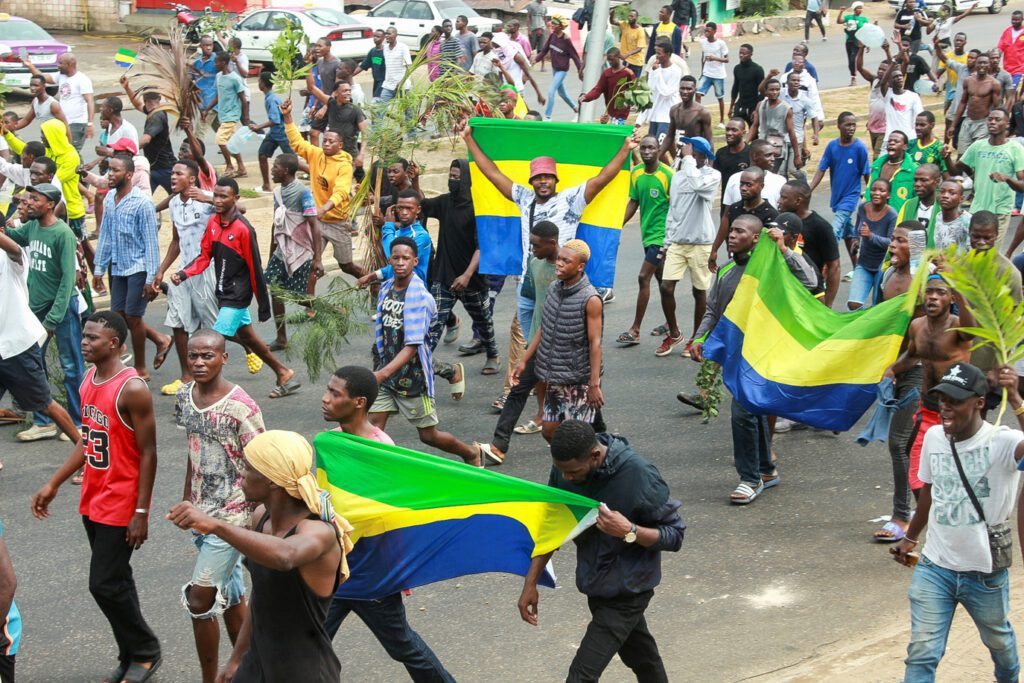The corrupt oil-rentier dynastic regime ruling Gabon under the aegis of French neocolonialism has been an open secret for many decades, and there is therefore a weakened emphasis to condemn the recent coup d’état which removed the aged, sick, clinging Ali Bongo from power. The political crisis caused by Bongo’s 2018 stroke and the opaque manner in which he continued to wield the reins of power through his close family during his convalescence had caused a variety of reactions.
On the one hand, criticisms emerged calling for his resignation and therefore the end of the Bongo dynasty’s over-fifty years’ grip on power, joined by democratic opponents who attempted to find a candidate around whom they might unite in the 2023 presidential elections. On the other hand, members of the Parti Démocratique Gabonais (PDG) remained loyal and continued to play an institutional charade of cabinet meetings and rubber-stamp legislation that masked the troubling absence of their party’s leader, joined by powerful clansmen (and women) inside the dynasty jockeying for position and wealth in the uncertainty surrounding the patriarch’s health and longevity in power.
Before the coup, there was little chance that Ali Bongo would lose his third re-election. With over 80% of the seats in the Parliament, a strict control by the ruling party of regional and municipal governments, an asphyxiating stranglehold on the courts, and a monopoly over public administration and the security apparatus of the state, ruling partybigwigs aspired to maintain their hold on power and continue to corruptly enrich themselves on the clientelist fruits of dynastic rule, rather than completing the constitutional reform towards multiparty democracy started in 1991. In continuity with the ‘dynastic’ approach to power of the Bongo family, the presidential palace seemed to be preparing for a re-election of Ali Bongo as a vehicle for the transfer of power to his eldest son Noureddine Bongo, under the auspices of his mother, Sylvia Bongo Ondimba, a sort of behind the scenes regent queen.
The Military Solution
Under these circumstances, the expected scenario during presidential elections was set to be an unfair election, followed by a non-credible ruling party victory angry protests and riots in the streets, a violent repression by the regime’s security forces, and subsequent acceptance, as had happened in the 2016 elections. Such situation was starting to unfold in the summer. The constitution was changed in such a way as to allow presidential, legislative, and local elections to be held at the same time (in order to maintain the ruling PDG’s monopoly over all three branches of government), the internet was suspended and both foreign journalists and electoral observers were hampered in reporting the electoral process while voting booths in opposition strongholds were not opened until six hours after the scheduled time and ballots with opposition candidates’ names were printed in insufficient numbers in those districts. Finally, the regime quickly announced an overwhelming 64.27% victory for their candidate Ali Bongo (whereas alternative ballot counts at 1,000 voting stations attributed 68% to opposition candidate Albert Ondo Ossa). However, before any form of protest – and subsequent repression – could unravel, the army took a different stance than in 2016. General Brice Oligui Nguema told the French ambassador in Libreville that “the army no longer wanted to be used to kill Gabonese after each election.” Ali Bongo was placed under house arrest and his family got arrested.
Why now and the way forward
The only thing which had united the as-usual all-too-numerous opposition parties (who barely managed to rally around a common candidate until nine days before election day) was the call to remove Ali Bongo from power. It will now be hard for Albert Ondo Ossa, officially credited with 30.77% of the vote, to take office since the military has already accomplished what he had only promised. General Nguema, a long-time member of the Bongo regime was designated by the “Committee for Transition and Restauration of Institutions” as Gabon’s new interim president. Why, after so many decades, has the military chosen to abandon the Bongos? Most of the justifications for deposing the ruling family were already present in 2009 and 2016: international revelations of wholesale corruption, luxurious lifestyles, omnipresent nepotism, courtier favoritism, failed reforms (13 achievements out of 105 promises), a “zombie” presidential presence. But why did the military act now?
Two main reasons best explain the 2023 coup. First, the contagion effect across the African continent. A series of coups in Mali (2020 and 2021), Chad (2021), Guinea (2021), Burkina Faso (two in 2022), and Niger (2023) appear to have demonstrated to Gabon’s military that not only was a successful coup possible, but it was also acceptable. In fact, after the military takeover, crowds came out in Libreville and danced in the streets. Second, General Nguema had been in a power conflict with the reigning First Lady and her heir apparent after the president’s stroke in 2018. In this presidential power politics, Nguema was unwisely replaced in his functions by the president’s half-brother Frederic Bongo, before returning to grace in 2019. Since then, he has been appointing officers and surrounding himself with a loyal entourage.
So now, given the willingness of France and the United States to accept his palace coup, the only questions that remains is: will he lead a transition to civilian rule, hold election and, refuse to present himself for office, or will he become the next member of the Bongo clan (General Nguema is a cousin of Ali Bongo) to rule this rentier state?
Source link : https://www.ispionline.it/en/publication/gabons-coup-a-turning-point-in-dynastic-rule-139723
Author :
Publish date : 2023-09-06 07:00:00
Copyright for syndicated content belongs to the linked Source.
